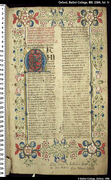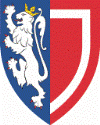Balliol College Archives & Manuscripts |
Back to: Home > Archives & Manuscripts
Ancient manuscripts: a summary history of the collection
 Although books for the scholars to read are not mentioned in Dervorguilla's Statutes of 1282, and no documents survive relating to Balliol's library in the medieval period except a few wills, surviving volumes show that the scholars began collecting books early in the college's history. By May 1276 a standard university text, Boethius' De musica (MS 317), had been left to the College by Peter de Cossington. A number of the medieval manuscripts still in the College were given in the first forty years of the 14th century: a valuable collection was building up. Not only were they essential reading for the scholars; they represented capital in portable and negotiable form, and could be 'pledged' or pawned to the University if the College needed ready money; a number bear records of such pledges.[1] The first mention of the common ownership of books by the scholars is in the gift by Sir William Felton in 1343. The volumes, when not in pawn or on loan to individual Fellows, would have been kept at first in a chest. Gifts and bequests continued; inventory marks in surviving manuscripts show that by c.1385 the College owned at least 155 volumes.
Although books for the scholars to read are not mentioned in Dervorguilla's Statutes of 1282, and no documents survive relating to Balliol's library in the medieval period except a few wills, surviving volumes show that the scholars began collecting books early in the college's history. By May 1276 a standard university text, Boethius' De musica (MS 317), had been left to the College by Peter de Cossington. A number of the medieval manuscripts still in the College were given in the first forty years of the 14th century: a valuable collection was building up. Not only were they essential reading for the scholars; they represented capital in portable and negotiable form, and could be 'pledged' or pawned to the University if the College needed ready money; a number bear records of such pledges.[1] The first mention of the common ownership of books by the scholars is in the gift by Sir William Felton in 1343. The volumes, when not in pawn or on loan to individual Fellows, would have been kept at first in a chest. Gifts and bequests continued; inventory marks in surviving manuscripts show that by c.1385 the College owned at least 155 volumes.
 The largest single donor of books to the college’s medieval library was a Fellow, William Gray, Bishop of Ely, who died in 1478. As his will does not survive, it is unclear whether he gave books to the College during his lifetime, bequeathed them on his death, or a combination of the two. Either way, nearly two hundred manuscripts of his gift, and one printed book, are still in the Library: more than half the surviving library of medieval Balliol. R.W.Hunt declares (VCH Oxfordshire iii 82) that Gray's is 'by far the finest, as well as the largest, private collection to survive in England from the Middle Ages'. Gray, a member of a distinguished family, came up to Balliol c.1431. He was Chancellor of the University c.1440-41, and had an impressive diplomatic and clerical career, becoming Bishop of Ely in 1454. He collected manuscripts, and had texts copied for him, all his life. He seems to have formed the idea of a scholar's library, suitable for a learned institution devoted to philosophy and theology. The wide range and high standard of his original texts in philosophy and theology is impressive. To these he added Greek Fathers in translation, some classical authors (Cicero, Virgil, Quintilian), some modern (Petrarch's letters, Guarino, Gasparino Barzizza), and a few humanist translations of short pieces from the Greek. Two other Fellows, Gray's associates, Nicholas Saxton and Richard Bole, also gave manuscripts at this time, as did Robert Abdy Master c.1475-83) .
The largest single donor of books to the college’s medieval library was a Fellow, William Gray, Bishop of Ely, who died in 1478. As his will does not survive, it is unclear whether he gave books to the College during his lifetime, bequeathed them on his death, or a combination of the two. Either way, nearly two hundred manuscripts of his gift, and one printed book, are still in the Library: more than half the surviving library of medieval Balliol. R.W.Hunt declares (VCH Oxfordshire iii 82) that Gray's is 'by far the finest, as well as the largest, private collection to survive in England from the Middle Ages'. Gray, a member of a distinguished family, came up to Balliol c.1431. He was Chancellor of the University c.1440-41, and had an impressive diplomatic and clerical career, becoming Bishop of Ely in 1454. He collected manuscripts, and had texts copied for him, all his life. He seems to have formed the idea of a scholar's library, suitable for a learned institution devoted to philosophy and theology. The wide range and high standard of his original texts in philosophy and theology is impressive. To these he added Greek Fathers in translation, some classical authors (Cicero, Virgil, Quintilian), some modern (Petrarch's letters, Guarino, Gasparino Barzizza), and a few humanist translations of short pieces from the Greek. Two other Fellows, Gray's associates, Nicholas Saxton and Richard Bole, also gave manuscripts at this time, as did Robert Abdy Master c.1475-83) .
 The Protestant reformers under Edward VI purged 'superstitious' works in c.1553: something like a third of the manuscripts were thrown out. None of the college's medieval liturgical manuscripts survive. More are said to have been sold by Robert Persons while a Fellow c. 1572, in order to restock the Library with works of reformed theology; this would have been during his Calvinist phase, before he became a Jesuit missionary. However, there is no solid foundation for this story. The 16th century saw the transition from manuscript to print in book production, and new acquisitions were mainly of printed books: some gifts of patristics, all probably in Latin, in editions of the 1530s and 40s, are recorded in the later Donors' Register. However, the manuscripts were on the whole retained, rather than being discarded in favour of newer printed texts. As a poor College with a large Library building and a manuscript collection of above average quality, Balliol had less motive to discard and more motive to preserve than wealthier colleges. From the latter part of the century onwards the custom, as elsewhere in Oxford, was for members of the College to present a book or books on admission or graduation and many survive, appropriately inscribed or with a printed label. Such gifts were nearly always concerned with the subjects currently taught.
The Protestant reformers under Edward VI purged 'superstitious' works in c.1553: something like a third of the manuscripts were thrown out. None of the college's medieval liturgical manuscripts survive. More are said to have been sold by Robert Persons while a Fellow c. 1572, in order to restock the Library with works of reformed theology; this would have been during his Calvinist phase, before he became a Jesuit missionary. However, there is no solid foundation for this story. The 16th century saw the transition from manuscript to print in book production, and new acquisitions were mainly of printed books: some gifts of patristics, all probably in Latin, in editions of the 1530s and 40s, are recorded in the later Donors' Register. However, the manuscripts were on the whole retained, rather than being discarded in favour of newer printed texts. As a poor College with a large Library building and a manuscript collection of above average quality, Balliol had less motive to discard and more motive to preserve than wealthier colleges. From the latter part of the century onwards the custom, as elsewhere in Oxford, was for members of the College to present a book or books on admission or graduation and many survive, appropriately inscribed or with a printed label. Such gifts were nearly always concerned with the subjects currently taught.
 Some manuscript book acquisition did survive well into the age of printing; George Coningesby (d.1768), a Herefordshire antiquary, left a 12th century Herefordshire Domesday book, St Guthlac's Cartulary, and a Welsh commonplace book by Sir John Prise among other manuscripts, as well as a large collection of printed books. A small collection of oriental manuscripts was given c.1790. In the mid 19th century Richard Hill's early 16th century Commonplace book ( MS 354), the source of many English carols and one of Balliol's most important manuscripts, was discovered in the Library.
Some manuscript book acquisition did survive well into the age of printing; George Coningesby (d.1768), a Herefordshire antiquary, left a 12th century Herefordshire Domesday book, St Guthlac's Cartulary, and a Welsh commonplace book by Sir John Prise among other manuscripts, as well as a large collection of printed books. A small collection of oriental manuscripts was given c.1790. In the mid 19th century Richard Hill's early 16th century Commonplace book ( MS 354), the source of many English carols and one of Balliol's most important manuscripts, was discovered in the Library.
- this summary by Dr Penelope Bulloch, with additions by Anna Sander.
Bibliography re Balliol's medieval library, book owners and benefactors:
For a study of book-pledging (i.e. pawning) practices in Oxford in the late 15th century, see † M.B. Parkes. "Thomas Hunt and the Oxford Book-Business in the Late Fifteenth Century." The Library: The Transactions of the Bibliographical Society 17.1 (2016): 28-39. Project MUSE. Web. 5 Apr. 2016. <https://muse.jhu.edu/>. The editors of this article also provide further useful bibliography on the subject of book provision in late-medieval Oxford.
Kennedy, Kathleen. 'Cosmopolitan Artists, Florentine Initials and the Wycliffite Bible.' Duke Humphrey and English Humanism in the Fifteenth Century. ed. JP Hornbeck & M Van Dussen. Fordham UP: 2017. pp.46-65.
Haines, R.M. (1974) ‘The Associates and Familia of William Gray and his use of patronage while bishop of Ely (1454–78)’,The Journal of Ecclesiastical History, 25(3), pp. 225–247. doi: 10.1017/S0022046900047928.
de la Mare, A.C. 'A Fragment of Augustine in the hand of Theodericus Werken.' Transactions of the Cambridge Bibliographical Society Vol. 6, No. 5 (1976), pp. 285-290 Stable URL: http://www.jstor.org/stable/41155375
A more detailed history of the College library from its foundation is given in the Introduction to Mynors' catalogue: online here.
The medieval manuscripts are stored and made available to readers in person in the new facilities at St Cross Church, Holywell. Enquiries about the collection and requests to consult manuscripts should be made in writing to the Archivist and Curator of Manuscripts, Anna Sander.
You do not need to request permission to download or print one copy of any of the images on these pages for your personal private study or research purposes.
You do need to request permission in writing to use any of these images for any publication in any format, including any use on a website.
There is no charge for Archive enquiries, but donations for Archive purposes are always appreciated.
| Updated 13.x.16
|
Balliol College All rights reserved © 2026 |
